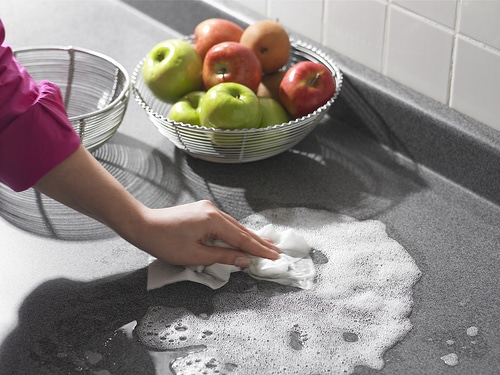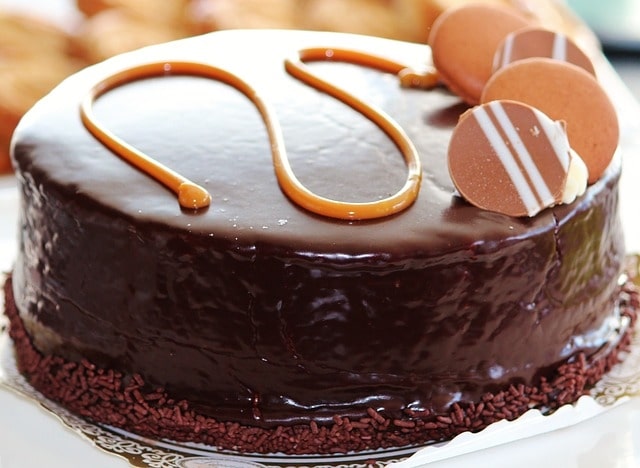Jasmine Birtles
Your money-making expert. Financial journalist, TV and radio personality.

Do you have all the skills to bake delicious and tasty cakes? Then you could make money baking.
Take a look at our guide for starting up a baking business below:

Home cooking, especially baking cakes and cupcakes, is very fashionable right now. This is thanks to celebrity chefs and cooking programmes like the Great British Bake Off. People will pay good money for high quality baking. You can sell your food at parties, fairs, and even at local food markets.
The beautiful thing about earning by baking is that it’s straightforward, flexible and enjoyable. It isn’t something that you necessarily have to do on a regular basis if you don’t want to. But if you’re ever short on cash, the option is there. All you’ll really need is a few good recipes and a reasonable idea of what people want to buy.
There are many places that you can sell cakes and other sweet products.
Remember location is important. Before you decide to make a real go of baking, first find out what sells and where.
Working out the basics of your business first will hopefully help you keep on track with your budget. Running your own business can be exciting and rewarding but also stressful and taxing. But if you follow our tips, you’ll find your baking life will be made much easier.
Don’t spend any more than you have to on your start-up. Lots of big businesses start small, for example Laura Ashley began at her kitchen table. M&S started with a market stall, and Tesco was just a couple of local grocer’s shops at the beginning. Consider using your kitchen as your workplace before moving somewhere bigger.
Don’t forget insurance, as your household insurance may no longer be valid if you’re working from home. This is something you’ll need to check with your current broker. You may need to upgrade your insurance.
Set up a separate bank account for your business. It doesn’t need to be an expensive ‘business’ account, it can be an ordinary current account. Either with your current bank or with a different provider.
Starting up a new business can be hard, so any help financially can really make the difference. Don’t assume that people will pay on time every time.
As the saying goes: if you fail to plan, you plan to fail. Therefore, even if you’re just setting up as a part-timer you need to give yourself a clear idea of your monthly costs and how much profit (or other income) you must generate to keep going.
Work out what your monthly sales need to be, factoring in costs like baking equipment, ingredients, delivery etc. Make yourself a chart for the next 12 months showing the growth in sales you can realistically generate and be clear on how you’ll generate those new customers.
It’s a tough thing to guess but just the action of thinking it through will provide you with earnings goals and points to consider as you run your business.
The more you’re out touting for work, the more work you’re likely get. With the internet it’s possible to meet people without leaving your home.
Join online networking groups and forums and start giving useful advice on areas directly relevant to your business. This raises your profile in a positive way. But don’t spend too much time on it, allocate a certain amount of time a week and stick to that.
A simple way to get some repeat business is to get some business cards printed. If you’re making cakes, you could then advertise the fact that you bake to order for parties and events. Pop into local cafes and coffee shops (not the chain outlets), hand them your card and make your services known. Maybe even provide them with a few samples. Make sure you take your business cards wherever you go. You can meet interesting and potentially useful people anywhere.
Don’t make the mistake of being blinkered about what you want to produce and sell. You have to be very aware of what your potential and existing customers want to spend money on. Not just what you think they want because it’s easier for you.
Speak to potential customers, both before you start up the business and as an ongoing habit. Take them to lunch, pick their brains, ask them what they want and enjoy.
Keep a realistic perspective of what’s selling as your business develops. Is there a sideline product or service that’s very popular and takes less effort than the main offering? If so, focus more effort on it. Be honest with yourself about what works, what doesn’t. If you have to make enough to pay the rent, then you need to be brutally honest about the success or failure of products pretty quickly.

The first thing you should do is research the food safety standards. Legislation says that all food businesses must register their kitchens with their local authority unless they operate on a “casual and limited” basis.
If you’re simply selling once in a blue moon at a car boot sale or market then you don’t need to worry. However, if you are planning on making an income in this way, contact your local council and ask them what the rules are in your area. Laws vary depending on where you live. For example, in some places you will need to become a registered trader, even if you only sell your food once every couple of months.
Be aware that if you’re regularly selling food produce, you may need to need to take a course in food hygiene. You can do this over the internet and it’ll cost you around £15. The course is mostly just common sense so it’s reasonably easy to complete.
If you want to make money baking, you need to do some basic costings. It doesn’t have to be complicated. You’ll need to take into consideration:
Once you’ve worked out how much all of this is, you should be able to work out how much you’ll need to sell to make a profit.
While you do your research, you should be taking note of how much other stallholders sell their cakes and foods for. This gives you a rough idea of how much you can reasonably expect to charge.
You don’t have to be qualified to sell cakes, but there are hundreds of baking/cake decorating courses you can go on which are likely to benefit the quality of your products.
Here are a few we recommend:
Try out a stall at a car boot sale first, because it won’t cost much to set up. You can find your nearest car boot sale on Carbootjunction. Once you’re more established, you might consider going a little more upmarket. Although if you have cracked the car boot market, you could also simply increase the number of cakes you take with you. Letting your business grow that way.
To set up a stall at a farmers’ market, you need to find one local to you. You can do this by searching Facebook or the Local Foods website for your nearest market.

It’s a crowded market so how do you make sure people want your cakes?
The cake business has been around for longer than anyone can remember and in recent years the market has become very crowded. It’s important that you create and sell things people will want to buy. Chances are somebody will already have the best butter cream filling or the tastiest frosted cupcakes. How are you going to make sure you stand out from your competitors? Think outside the box. Take a trip to your local car boot sale or farmers’ market and look for which food stalls are the busiest. If it seems like jam is the ‘in-thing’ and there aren’t that many stalls that sell it, you’ve found your product: jam filled cakes.
If you’re at a car boot and there aren’t any stalls selling food then it’s a good idea to take a look at the people that are there. Are they the sort who would prefer to buy upmarket, fancy, homemade produce or a couple of 20p fairy buns to nibble on? Make the kind of cakes and sweets you think you could sell easily.
You can also ask your family and friends what they’d like. Try to ask a wide range of people and see if you come out with any unanimous decisions. Also, speak to any cake sellers you see at fairs and markets and ask them which cakes sell best.
Once you’ve got a good idea of the kind of people you’re going to be selling to, it’s time to get your product sorted. You’ll need to come up with a range of different products to make this work. If you’re selling cake, try out different methods, ingredients, flavours and fillings. With sweets, test out different recipes. You could try focusing on one area, like chocolate, fudge or maybe even health food.
Get your friends and family to try all your samples out and find out which are the most popular choices. They’ll likely be more than willing to help. It’s worth knowing that at farmers’ markets, you’re not likely to sell much unless you use local, organic ingredients. People who go to these events look for traditional homemade foods and one of the pros of shopping for food at a farmers’ market is that you’re able to ask the stallholder precisely where the food is from and how it was made.
Stallholders at farmers’ markets should be prepared to give honest, credible answers to customers. So factor these more expensive ingredients into your budget. Remember that people are usually willing to pay for high quality.
Presentation is important, particularly if you sell at an upmarket venue. Consider your customers: are they going to want something ‘cheap and cheerful’, or posh-looking homemade produce? Funnily enough, some of the more expensive jams and cakes have ‘the rustic look’: you could find yourself charging a lot for produce which looks especially homely.
Packaging can affect your sales in a big way. Ribbon is cheap if you buy in bulk from a haberdashery store, and can neaten up any edges around your cakes. If you’re selling jams it’s worth getting some fancy labels printed, or spending some time decorating your own. You could experiment with themed packaging around holidays like Easter and Christmas, and for days like Valentine’s Day and Halloween
Whatever you use to package your products, it’s important to remember that you’re dealing with food. This means that you are limited to certain types of packaging depending on what food you’re selling.
Everyone loves hampers – particularly at special seasons or occasions like birthdays. Big stores like Harrods and M&S do a roaring trade in them – have a look at their hampers to give yourself ideas of what to put in yours. Actually making the hamper can cost very little and the goodies inside can be made at home to bring down costs. However, the selling price can be as high as you like, so this is an amazing potential earner if you get it right.
Seasonal hampers can be best sellers if you do them right. Easter and Christmas will be the best time to make seasonal hampers. Everyone likes a Santa-shaped cake or Easter bunny cookie.
It’s important to remember that these hampers or baskets are meant as gifts. So they should look as gorgeous as possible. If a customer is not wowed by the first hamper you supply, they are far less likely to buy from you again.
The key to decorating baskets effectively and cheaply is to keep it simple. Place some shredded paper in the bottom of the hamper to protect your goods. Then arrange your items so they’re all facing the same way, looking up at the buyer.
If you want to add a little more luxury you could tie a ribbon around the hamper. Or you could drop a few foiled chocolates to cover empty space. Simplicity is the key for decoration of hampers.
To add touches of Easter arrange a few decoration chicks in the hamper or a few false flowers. You could also paint eggs and use them to add colour to your basket. At Christmas add some tinsel and a few red or green bow.
To work out how to price your hamper, there are a few things you need to take into consideration.
The first and most obvious is how much it costs to make. This includes the items inside the hamper, the basket itself, the decorations. And finally the costs for the delivery, if relevant.
The second cost is your time: how long does it take to make a hamper? Consider how much you would like to pay yourself an hour and incorporate this into the costs.
Once you have a good idea of how much each hamper costs to make and distribute in total, you can decide how much you are going to mark the price up. Other factors to consider are the quality of your hamper, and what you think the market will bear. Remember that if the price is too high then customers will use one of your rivals, so be competitive without selling yourself short.
For more ideas about how to present and sell hampers see our article here.
Seasonal cakes and cupcakes are also very popular. The safest thing is to go for very simple, cheap cake and biscuit recipes that you can decorate to look really special. Think about sponge cakes, madeiras, shortbread biscuits, gingerbread etc. None of these cost too much to make. With a little extra spent on the icing and decoration, though, you could charge three or four times the cost of making them.

At Easter you can offer baskets with cakes such as simnel cake, hot cross buns, nest cakes or Easter biscuits. There are many recipes on the internet and in cook books available at your local book store. The BBC Food website has easy-to-follow hot cross bun, Easter biscuit and simnel cake recipes.
To find out how to make chocolate nest cakes visit cakebaker.co.uk. Another particularly good collection of Easter cake recipes can be found here.
Christmas cakes can come in all different shapes and sizes. A Snowman topped with a delicious layer of snowy buttercream icing. A Christmas tree with green icing and hundred and thousands for decorations. Or something more traditional like a rounded fruit cake. Fruit cakes are very seasonal but they cost a lot to make. Will you be able to make enough of a profit on them? Whichever way you choose to go, make sure you’re original.
Biscuits are also great for Christmas. Buy a cutter set and make biscuits in the shape of trees and snowflakes, then add some colourful icing and a few silver balls. You could put your biscuits in a simple see through bags with a nice ribbon so they can hang from the tree. This way they can act as a decoration as well as a tasty Christmas treat.
Birthday cakes are great because people have birthdays all year round so there is sure to be a demand for your services if your price is right. With birthday cakes people will usually ask for a specific cake, maybe a Spider-Man cake or in the shape of a number.
This is a great time to experiment with food colouring, icing options and build up your portfolio. If someone asks for something you don’t think you can handle, though, don’t take it on just because they are offering you their money. Make sure you have the skills to create what your customer is asking for.
There are so many special occasions that could be used as an opportunity to offer your baking services, including baby showers, retirement parties, graduations, weddings and many more.
Running a business should be creative, satisfying and enjoyable. It’s a chance to express yourself, meet interesting and creative people, and potentially make a lot of money. So enjoy the process of being in business. And make the most of the good times.
When you get a big contract or when you complete a difficult task remember to celebrate!
To inspire you to get started with your baking business we have two real life case studies of how you can turn your hobby into a fully functioning money-making business. Both case studies were self-taught bakers! See below:
Whitney Hurst started selling cakes from her kitchen in 2012. Before she knew it she had a load of orders and decided to set up her own shop, Lazy Day Cakes. Recently she decided to sell up to pursue her dream of becoming a midwife. Below Whitney tells us about her success and experience of selling cakes.
“In 2012 I fractured my spine in a gym accident. After months being bedbound and unable to work I was finally able to shuffle round my kitchen and that’s when I started baking. I had made my kids birthday cakes in the past but I got started on cupcakes. I was making 30+ a day and that’s when I decided to make a website to see what happened. Amazingly within a few days I had orders.”
“I started by going to craft fairs and ladies’ nights. It didn’t take long to realise that ladies love cakes but also are very conscious of them being a treat so I came up with a new recipe that reduced the fat content if the cakes by 50% that’s when things started to go mental.”
“My only form of advertising was Facebook. I just put up lots and lots of pictures and that’s when the word started to spread. I was very lucky because people not only liked the look of the cakes but the taste was a win too. Quite often with cupcakes they look great but the taste isn’t always up to scratch.”
“It took probably six months of events such as craft fairs before we started getting recognised.”
“I did the cakes from home for 12 months doing the craft fairs, farmers’ markets and ladies’ nights. In June 2013, I opened the first shop where I had just four tables and a serving counter. I was still baking everything at home and transporting the cakes to the shop daily. In October 2013, I moved into a shop three times the size where I had a full bakery and a much larger cafe area.”
“No. I am totally self-taught.”
“There were two other local business that were similar. What made us different was that having four kids we were so child-friendly that people with kids wanted to come just so that they didn’t have to worry about messy children. Our workshops and parties were priced reasonably because the rent overheads were relatively low. The other business that offered just workshops was really expensive because of its city centre location, and the other just did parties whereas we did both and had a tearoom.”
“I wanted to pursue my passion of becoming a midwife and now that I have the support from my fiancé Ian, to go back to university I decided to enroll. I decided juggling the business and my studies wasn’t a possibility and closing the shop wasn’t really an option – considering how successful it was – so I decided to sell.”
Whitney’s advice to those wanting to make baking a full time career…
“My advice to anyone wanting to set up a cake business is trust your abilities. It’s very difficult to compete with supermarket prices but they’re full of chemicals and made in machines. Don’t sell yourself short, work out how much the ingredients cost, how long it’ll take you to make the cake and add your time and at least minimum wage.”
Tarek Malouf was working at ABC News in London before he decided to start a bakery business in 2002. Following two years of researching and testing recipes, his first bakery opened its doors for business in early 2004. Below Tarek tells us about his journey to success and future plans for expansion.
“The idea of setting up a bakery came to me in early 2002. I was visiting a relative in North Carolina who took me to several traditional American bakeries that served pies and homemade cakes. The smell of fresh baking in these places was amazing. During that time, my sister was living in New York, and we used to go and eat lots of cupcakes and traditional American goodies every time I’d visit her. Taste buds awoken, it was then that I realised I wanted to open my own bakery in London so that people here could enjoy the authentic taste of American baking.”
“Our launch was not promoted in any way. I tried to choose a location for my first branch that had plenty of American expats living close by, as well as a lot of passing foot-traffic. I thought that if we could attract the Americans wanting a taste of home, then we’d start off with a decent customer base. This worked – a very large proportion of our initial customers were American. And after we opened the doors and let the smells of fresh baking waft out onto the street we soon started selling cupcakes to everyone who walked by.”
“Prior to first opening The Hummingbird Bakery, I spent two years testing and refining countless recipes in my kitchen at home. Other than this, however, I had no real baking experience. I’d grown up with a great appreciation for the delights of American baking so I did at least have a very clear idea of how I wanted The Hummingbird Bakery’s products to taste. So really, my first professional baking job was in my Notting Hill branch.”
“Prior to opening my first bakery, I did do a couple of private cake commissions for friends but this was in no way how I launched. Having fitted out, equipped and opened the doors to my first branch, the business got itself established very quickly. Within a few weeks of launching, word quickly got around that we were baking delicious cakes and business began to grow rapidly.”
“I have no professional training in baking other than that which I’ve gained from working in my own bakery.”
“Initially, we were in the fortunate position of being able to get the business off the ground with no real competitors – there certainly wasn’t anywhere else in London that specialised in quality American baking. Of course, as soon as cupcakes caught on, other cupcake bakeries did quickly pop-up. We have always differentiated ourselves on the quality and authenticity of our products. Another thing we do is bake on site at each of our branches throughout the day to ensure the complete freshness of our products. We also only source quality ingredients – real butter, jams and preserves from Tiptree, free range British eggs, cream cheese from Philadelphia and so on.”
“I plan to grow the business here in UK by opening further branches within and around London. I’m also looking at opportunities to open branches in other UK cities. We have franchise partners in the Middle East who have already launched three Hummingbird Bakery branches in Dubai.”

Thank you for this detailed guide! Excited to start my baking journey. The business plan tips are gold, and networking feels crucial. Any more advice on creating unique hampers?
I just wish I could bake!